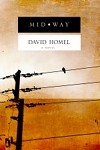“Do not create anything,” famously wrote Bob Dylan in his poem “Advice for Geraldine on her Miscellaneous Birthday”: “it will be misinterpreted. / it will not change. / it will follow you the rest of your life.”
Dylan fortunately ignored his own demons and advice, and went on to write rather prolifically. Ben Allen, the hero of David Homel’s latest novel, Midway, might very well do the same.
Ben is a married, middle-aged Montreal literature teacher who has written a semi-fictional, historical essay on dromomania, a condition he imagines affected men in nineteenth-century France, causing them to abandon the comforts of domesticity and wander off into foreign lands.
Upon learning that his essay has won a prize, Ben echoes Dylan’s apprehension: “Every piece of writing is an ungrateful monster. Instead of being happy just to exist, it demands more and more of the creator’s being. Never write anything if you can help it.”

Midway
David Homel
Cormorant Books
$21.00
paper
320pp
9781897151884
Yet Ben’s budding artistic inclinations prove harder and harder to repress. He romanticizes the dark and dangerous side of creativity, and even contemplates the suicide note as a literary genre, wondering how he could get a hold of 100 samples for research.
Soon, the reader begins to sense that art is but a sexy metaphor for another frisky business: infidelity. Both activities involve risking everything to wander off into an uncertain future, and both, Ben supposes, can involve hurting those closest to you. “When he met Laura, she was an artist, or at least a woman with artistic inclinations. But when she explained she was going into art therapy, he felt betrayed,” recalls Ben of the first time he considered leaving his wife.
Art means self-expression, even to the point of hurting people, not helping them … Besides, he wanted to sleep with an artist – that sounded sexy and free – not an art therapist, with the scent of musty Puritanism that surrounded the therapeutic professions.
Yet Ben is also a family man with a somewhat sensitive disposition. His urge to wander conflicts with his longing to connect more deeply with his father, son, and wife. Through Ben, Homel explores a realm more commonly depicted by female writers: the inner sphere of house and home. Studying close interpersonal relationships from a distinctly male perspective, he offers poignant portraits of fatherhood, such as when Ben watches over his sleeping infant son: “He stood over his bed and listened to Tony breathe, convinced that by just being in the room, he was shielding him from death.”
Also touching is Ben’s epiphany that the person he actually most craves an adventure with is Laura. At first, Ben doesn’t see how this could work. “The very words sounded absurd. You cannot have an affair with your wife.” But, as the story progresses, the idea takes root, leaving the reader wondering: if Ben chooses Laura over Carla, is he opting for art therapy over art, or – more romantically – is he about to make art of his marriage?
Whatever the case, one senses that his essay, as sometimes with art in general, may be more of a past self-portrait than a future one. By the time Ben’s – and perhaps Bob’s – demons were committed to the page, some may already have had one foot in the grave. mRb






0 Comments